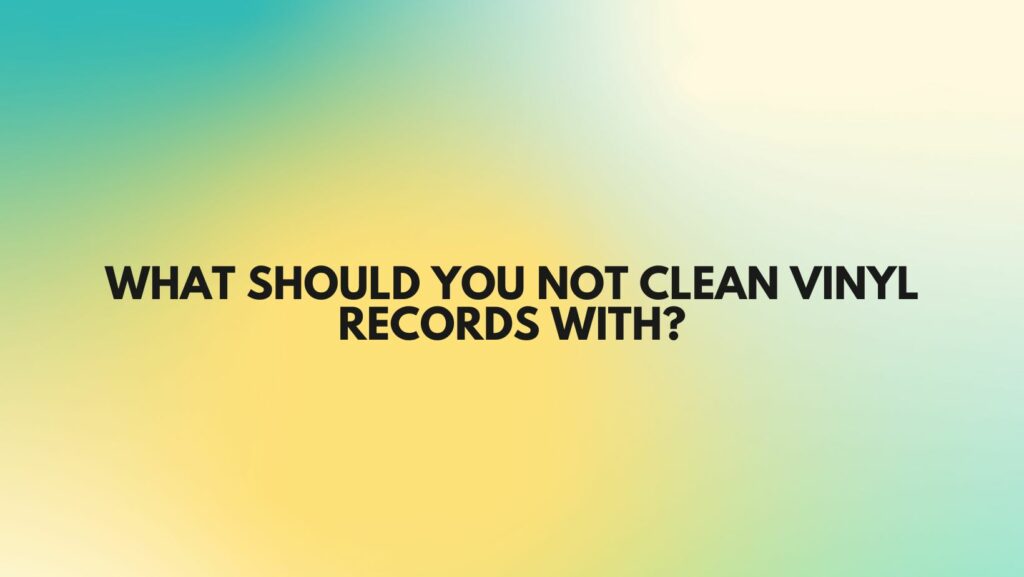Vinyl records, with their nostalgic warmth and authentic sound, require careful maintenance to ensure they stand the test of time. While regular cleaning is essential, using the wrong cleaning agents can have adverse effects on the delicate vinyl surfaces. In this guide, we’ll explore the pitfalls and potential risks associated with cleaning vinyl records, highlighting what you should avoid to preserve the integrity of your cherished collection.
- Say No to Household Cleaners:
Common household cleaners, such as kitchen sprays, glass cleaners, and all-purpose cleaners, contain chemicals that can harm vinyl records. Ingredients like ammonia and other harsh chemicals can damage the vinyl, alter its appearance, and compromise sound quality.
- Avoid Abrasive Brushes and Scrubbers:
While a gentle brush is an essential tool for vinyl record cleaning, abrasive brushes or scrubbers designed for other purposes should be avoided. These can scratch and damage the delicate grooves, leading to irreversible harm.
- Steer Clear of Tap Water:
Tap water, despite being seemingly harmless, can contain minerals and impurities that may leave residues on vinyl records after cleaning. These residues can negatively impact sound quality and potentially damage the record surface over time.
- No to Rubbing Alcohol and Acetone:
Substances like rubbing alcohol and acetone, known for their solvent properties, should be kept far away from vinyl records. These harsh chemicals can strip away protective coatings, damage the vinyl material, and result in permanent harm to the record.
- Steer Clear of Dishwashing Detergents:
Dishwashing detergents may seem like a gentle option, but they often contain additives and fragrances that can leave residues on the record. The waxy film left behind can attract dust and compromise the overall listening experience.
- Avoid DIY Mixtures with Vinegar:
While white vinegar is a popular DIY cleaning option for some household items, it may not be the best choice for vinyl records. Its acidic nature can potentially interact negatively with the vinyl surface and affect sound quality. Commercially available record cleaning solutions are formulated to be gentler and more effective.
- No to Silicones and Wax-Based Cleaners:
Silicones and wax-based cleaners, often used for furniture or car care, should be avoided when cleaning vinyl records. These substances can leave a sticky residue, attracting dust and compromising the performance of the stylus.
- Steer Clear of Metal Polish:
Metal polish contains abrasive particles that can cause irreparable damage to vinyl records. The abrasive nature of these particles can scratch the surface and impact the playback quality.
- Say No to Hairspray:
Hairspray, sometimes suggested as a DIY cleaning solution, is not suitable for vinyl records. The residues left behind can attract dust, and the chemicals in hairspray may interact unfavorably with the vinyl.
- Avoid Excessive Pressure:
Regardless of the cleaning solution used, avoid applying excessive pressure during the cleaning process. Too much pressure can damage the delicate grooves and affect the overall performance of the record.
Conclusion:
Preserving the longevity and sound quality of your vinyl records requires thoughtful consideration when selecting cleaning agents. Avoiding household cleaners, abrasive brushes, tap water, harsh solvents, and DIY mixtures with vinegar is crucial for maintaining the integrity of your cherished collection. Opt for purpose-built record cleaning solutions, soft brushes designed for vinyl, and a gentle touch to ensure that each spin brings forth the pure and authentic sound that vinyl enthusiasts hold dear. Remember, a cautious approach to cleaning is the key to ensuring your vinyl records stand the test of time.


